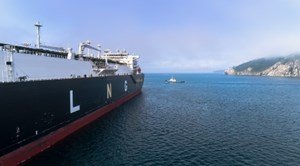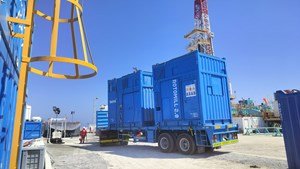(Bloomberg) – Liquefied natural gas demand and prices are both set to rise through the end of this year, according to Woodside Energy Group Ltd., Australia’s biggest producer of the fuel.
Woodside CEO Meg O’Neill
Declining domestic gas production and rising energy needs in emerging Asian economies such as India, the Philippines, Vietnam and Malaysia will help drive the growth, Chief Executive Officer Meg O’Neill said in an interview on Tuesday. Meanwhile, Japan, South Korea and China will remain key customers, she said.
“We’re starting to see more demand from the non-OECD nations in Asia,” O’Neill said on a call after the company released earnings for the six months through June. “As their economy grows, their energy demand grows.”
While oil prices have fallen this year as OPEC+ returns shuttered production, natural gas has remained strong in both Asia and Europe, O’Neill said in a separate interview with Bloomberg TV. LNG is traditionally sold under long-term contracts linked to oil. However, Woodside has benefited as about a quarter of its fuel is sold with an indexation to gas, O’Neill said.
“We are well-positioned for the gas market to pick up as you head toward the Northern Hemisphere winter,” she said. “That’s when gas is really in demand, and so we do expect prices to start to strengthen even further as we head toward the back half of the year.”
The Australian company reported underlying attributable profit fell 24% from a year earlier to $1.25 billion in the half. Woodside booked a $143 million impairment from its decision to exit the H2OK hydrogen project in Oklahoma, and a $430 million provision to decommission oil and gas fields.
“We continue to have an ambition to invest in these low-carbon energy sources and the alternatives to conventional fuels,” O’Neill said about hydrogen on Bloomberg TV. “But the market is evolving more slowly than folks might have thought four or five years ago.”
Meanwhile the higher decommissioning charge reflected unexpected complications at some legacy offshore fields, where engineers discovered residual oil and gas in pipelines that were thought to be empty, O’Neill said. Woodside has paused work while it re-examines how to safely dismantle the infrastructure, she said.
Revenue jumped 10% to $6.6 billion, following the start of the company’s Sangomar project in Senegal in June 2024. It declared a dividend of 53 cents a share, down 23%. The stock fell the most since June.
This article was originally posted at www.worldoil.com



Be the first to comment